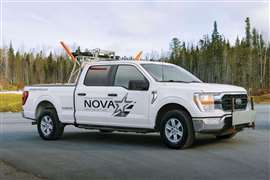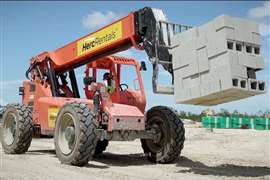Abu Dhabi mandates demolition contractor registration
17 January 2014
(1).gif)
A new initiative to improve safety in Abu Dhabi means demolition contractors have to register and meet minimum standards to be allowed to work in the emirates’ municipality.
The municipality of Abu Dhabi, which is to say just the city of the emirate which is the capital of UAE, has put a mandatory registration scheme in place for demolition contractors. According to Walid Ramadan, an engineer at the Abu Dhabi Municipality, the scheme was introduced to improve safety after a crawler crane tipped-over while using a wrecking ball in June 2011.
“We have announced that any company with a trade licence mentioning demolition activities cannot operate unless they are registered with us. To register they have to have a safety management system,” said Mr Ramadan, adding that to date 67 companies had joined the mandatory register.
The registration requirement for contractors covers eight broad areas. They must complete a prequalification form, list the heavy equipment they own along with operator licences and qualifications, be accredited to ISO 14001 environmental management standards, be registered with a waste centre, provide a copy of a corporate health, safety and environment plan, produce a generic risk assessment for demolition work, provide their company licence and a full list of names & contact details for their senior management.
This last measure is because, as Mr Ramadan put it, “We believe top management should take responsibility.”
According to Mr Ramadan, the catalyst for these requirements was a crane tip-over on July 12, 2011, when in attempting to free a wrecking ball from a 12 storey structure under demolition, a crawler crane operator cause the 52 m boom to collapse across a busy road. Fortunately no one was injured in the incident.
Contractors’ responsibilities now include the provision of a safe working environment, safe machinery and competent operators. “We see the state of machinery as a major issue,” said Mr Ramadan.
They also have to undertake various safety management activities before starting work, including gaining permits, putting emergency procedures in place, putting experienced staff in charge of work, securing sites and putting up hoardings and fences to protect the public. Most critical is the production of method statements and risk assessments, which must also be communicated to the client. As Mr Ramadan said, “Method statements and risk assessments are essential now.”
There are also requirements under the new laws on building owners, including providing drawings of the structure, locating services and any hazardous materials. The presence of hazardous materials such as asbestos triggers further procedures to ensure their safe removal.
Although these changes are significant in a previously loosely regulated industry, Mr Ramadan described them as a minimum standard. “Our requirements are as low as is reasonably practicable, but there is now ceiling for what companies can do,” he said.
However, he also said that the legal changes had already led to new, safer demolition practices being introduced, such as the use of high-reach demolition excavators. “We now have three companies using these new demolition techniques,” he said.







